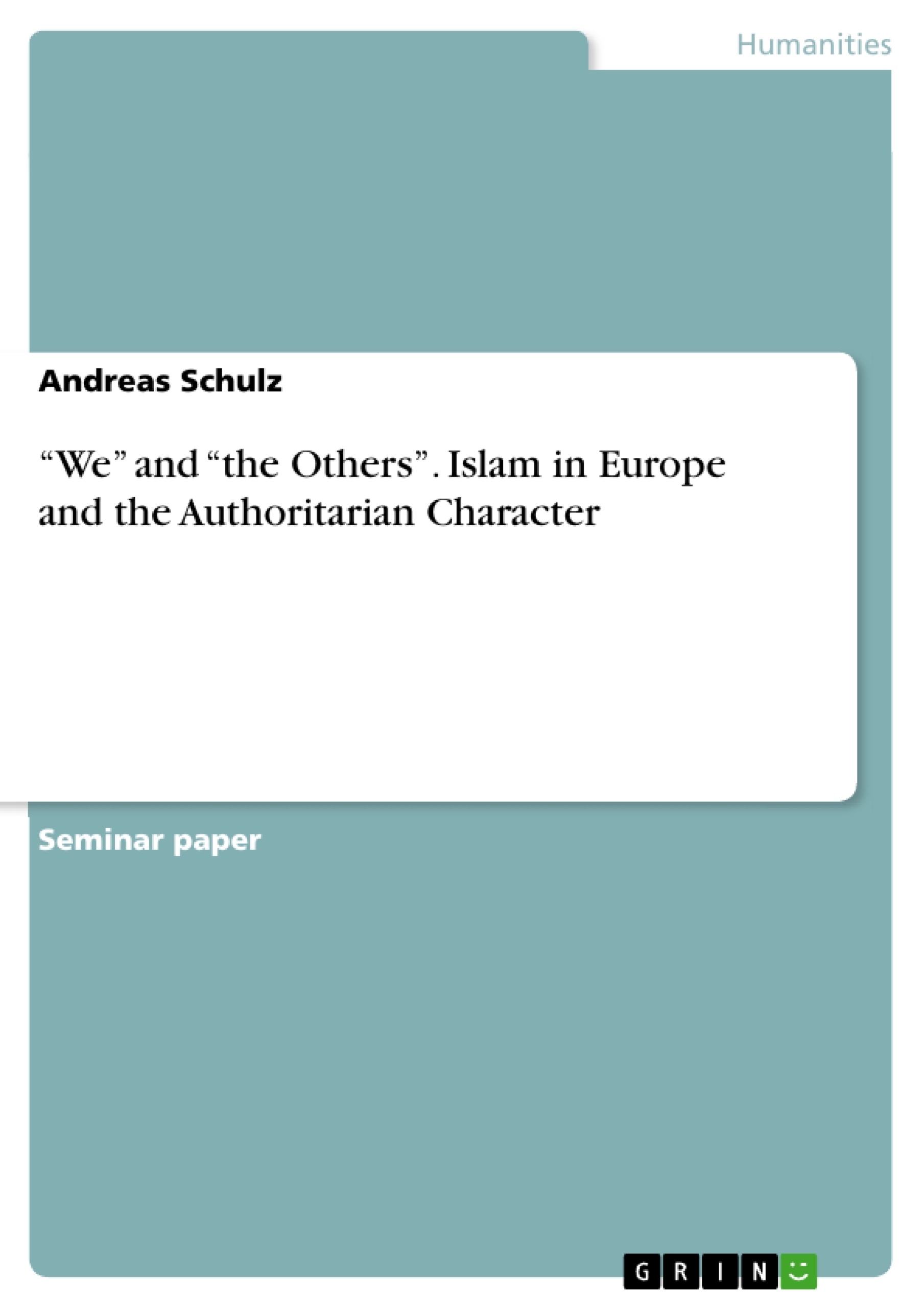I like to illustrate the development of the discussion of the others within the context of the recent decades and I would like to focus on the development of these hegemonic discourses like the construction of the Muslims. I would like to illustrate that the Islam cannot be accepted by the majority of the middle European populations for several reasons. One important factor is the authoritarian history of Germany and the follow-ups for the society. Another reason are principals of xenophobic characteristics, which relate to specific discourses in the media, are connected to the intensity of the relation towards Muslims, the knowledge about the Islam in general and politicians which instrumentalize islamistic terrorism to marginalize Muslims at all.
The Islam is often opposed to Europe rather than to the analogues religious term Christianity. In the medial, political and in less reflected sciences a dualism is constructed, opposing the European secularism towards the Islamic orientalism. Islam is seen as an anti-modern, anti-educational fundamentalism and become the ideological and cultural antithesis of the West.
The recent, so called, refugee crisis had become a political unit and politicizes the masses. Right wing politicians and organizations exploit the origin of their electors as well as the otherness of the refugees to get power. Topics concerning values and norms of ours (the western) societies are keywords in the mainstream discussion within media, the political sphere of discussion and always issued at the Stammtisch (regular table talks).
Inhaltsverzeichnis (Table of Contents)
- Introduction
- Islam in the West
- Case of Germany
- Discussion
- Conclusion
Zielsetzung und Themenschwerpunkte (Objectives and Key Themes)
This paper examines the complex relationship between Islam and Europe, focusing on the construction of “the other” and the role of authoritarianism in German society. It explores the historical and contemporary dynamics of Islam in the West, highlighting the media’s representation of Muslims and the impact of stereotypes on identity formation. The paper aims to contribute to the understanding of the “Islam in Europe” discourse, particularly within the context of Germany.
- The construction of “the other” in relation to Islam and Europe
- The impact of stereotypes and prejudice on Muslim identity
- The role of authoritarianism in shaping attitudes towards Islam in Germany
- The concept of Euro-Islam and its implications for integration
- The historical and contemporary dynamics of Muslim migration to Europe
Zusammenfassung der Kapitel (Chapter Summaries)
- Introduction: Introduces the topic of Islam in Europe and the construction of “the other,” drawing upon Edward Said’s concept of orientalism and Gerd Bauman’s theory of identity and alterity. The chapter sets the stage for the discussion by highlighting the negative stereotypes and prejudices often associated with Muslims in the West.
- Islam in the West: Explores the key issues surrounding the presence of Muslims in Western societies, focusing on the tension between individual rights and religious beliefs. The chapter highlights the conflict potential arising from issues like freedom of speech and the differing perspectives on gender equality in Islam.
- Case of Germany: Examines the specific case of Germany and the challenges faced by Muslim migrants. It discusses the role of media representation, the prevalence of stereotypes, and the impact on Muslim identity formation. The chapter also explores the concept of Euro-Islam and its relevance in the German context.
Schlüsselwörter (Keywords)
The central keywords of this paper include Islam, Europe, Orientalism, “the other,” stereotypes, prejudice, identity formation, authoritarianism, Germany, Euro-Islam, migration, and integration.
Frequently Asked Questions
What is the concept of "the other" in the context of Islam in Europe?
It refers to the social and cultural construction of Muslims as an antithesis to Western/European values, often portraying them as anti-modern or fundamentalist.
How does Germany's authoritarian history influence current attitudes?
The paper argues that Germany's historical authoritarian structures have left lasting impacts on society, contributing to xenophobic characteristics and the marginalization of minorities.
What role does the media play in the construction of Muslim identity?
Media discourses often instrumentalize terrorism to generalize and marginalize Muslims, creating a dualism between European secularism and Islamic "orientalism."
What is "Euro-Islam"?
Euro-Islam is a concept explored in the paper regarding the integration of Islamic faith with European democratic and secular values.
How do right-wing politicians use the "refugee crisis"?
They exploit the "otherness" of refugees and perceived threats to Western norms to politicize the masses and gain power.
- Citar trabajo
- Andreas Schulz (Autor), 2016, “We” and “the Others”. Islam in Europe and the Authoritarian Character, Múnich, GRIN Verlag, https://www.grin.com/document/319987



